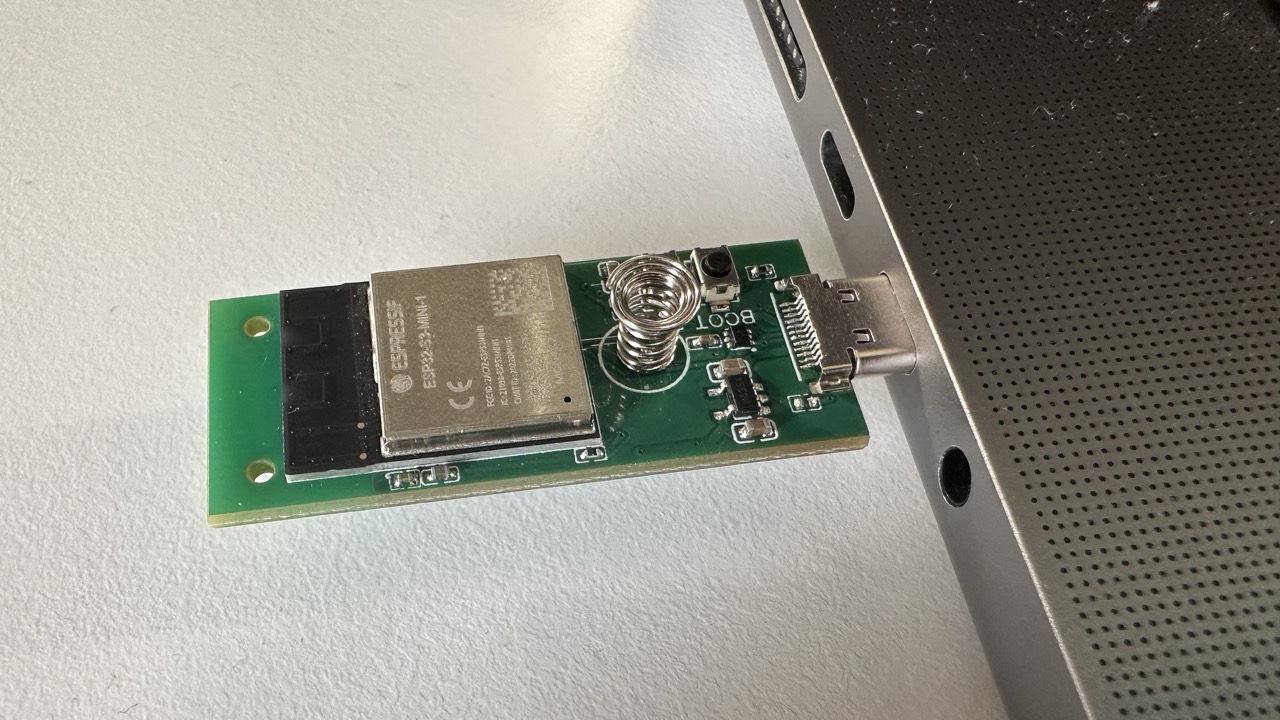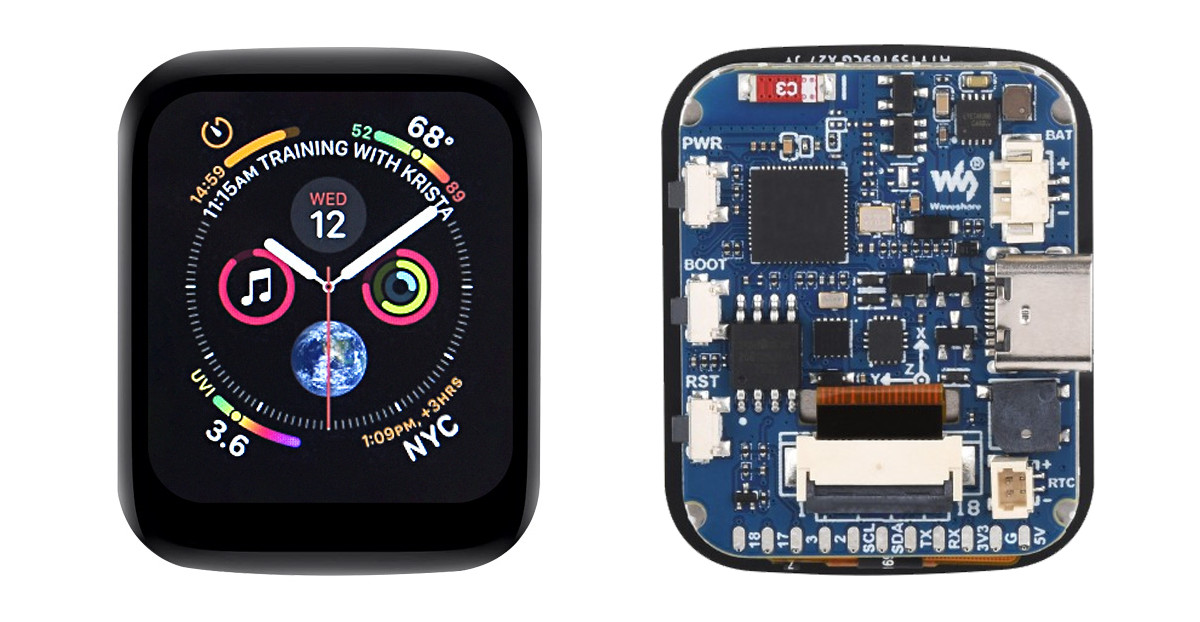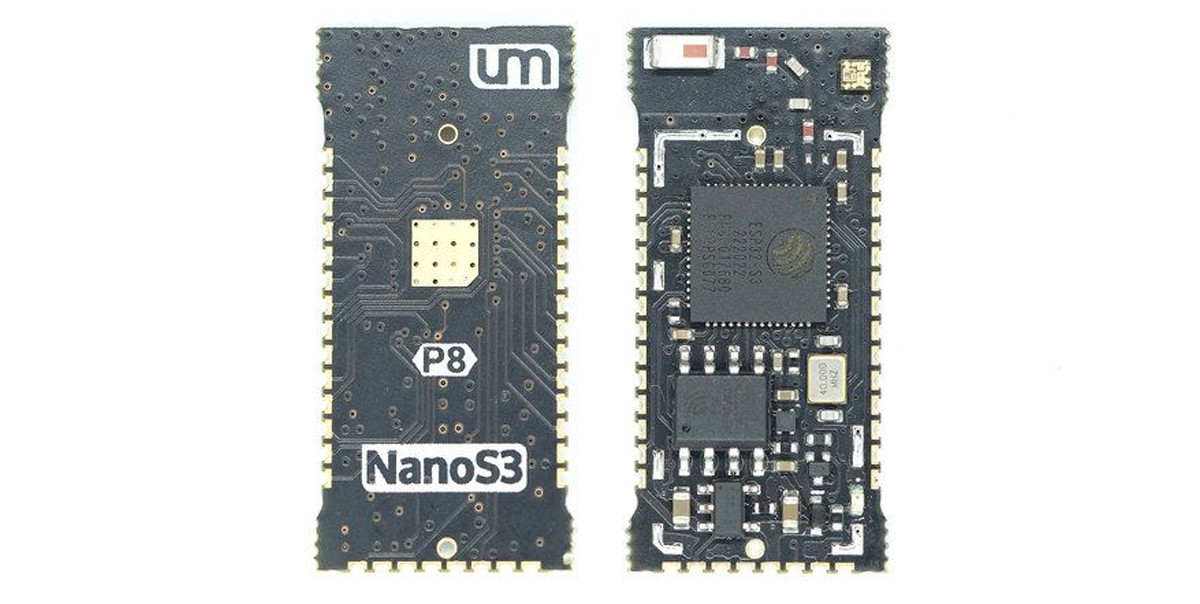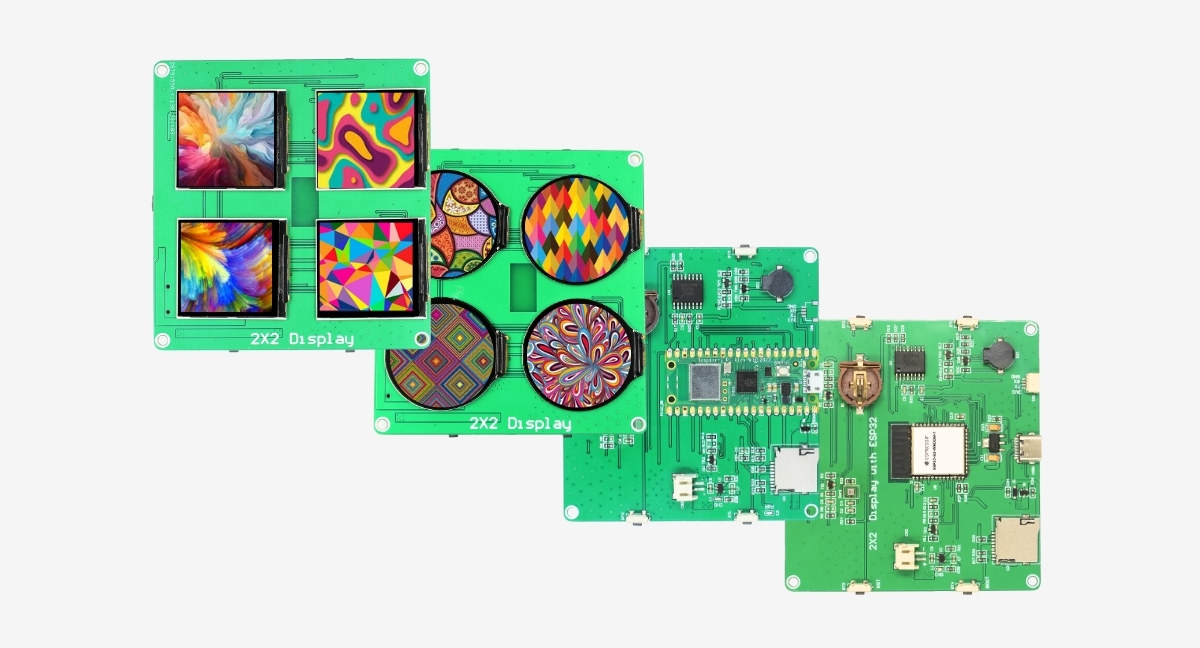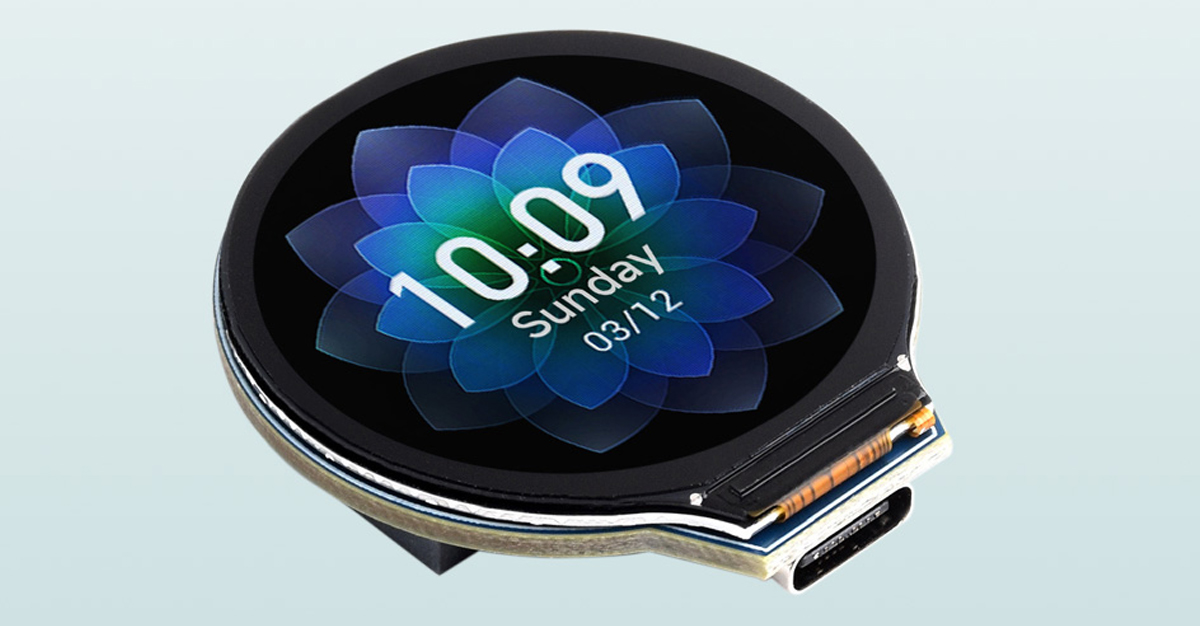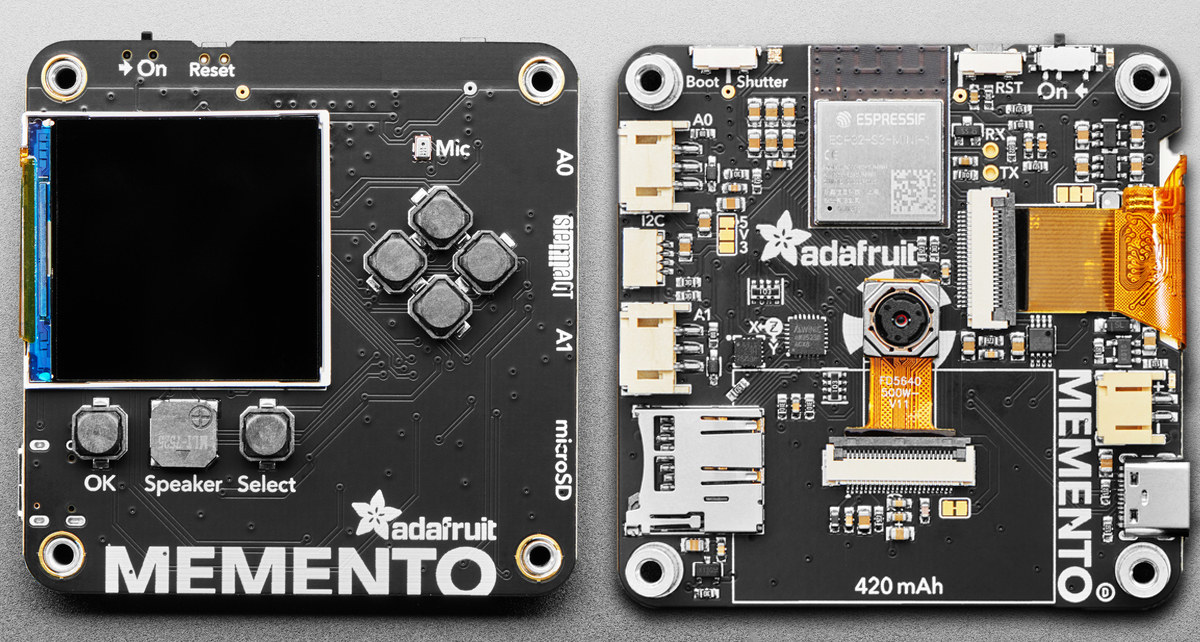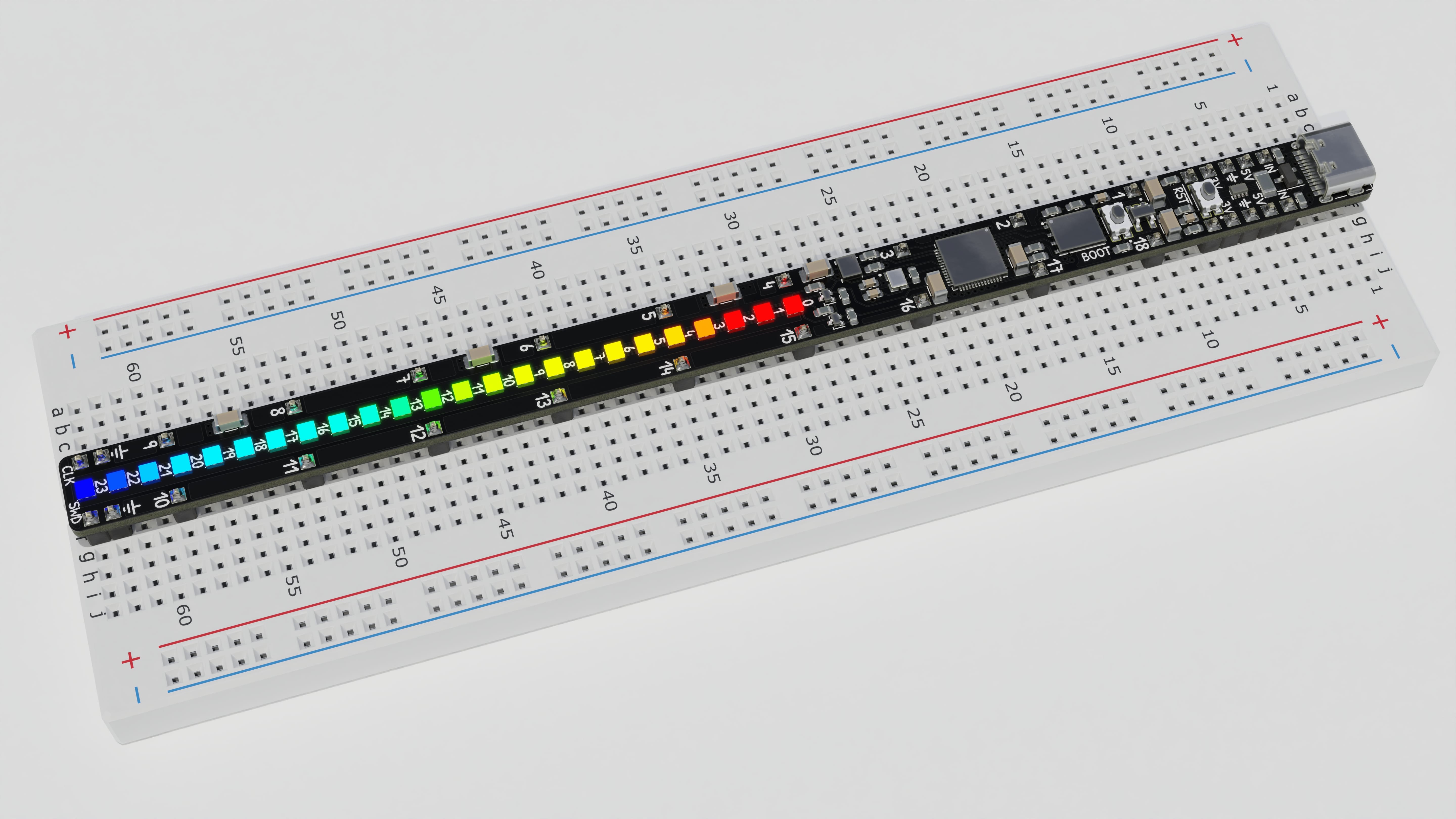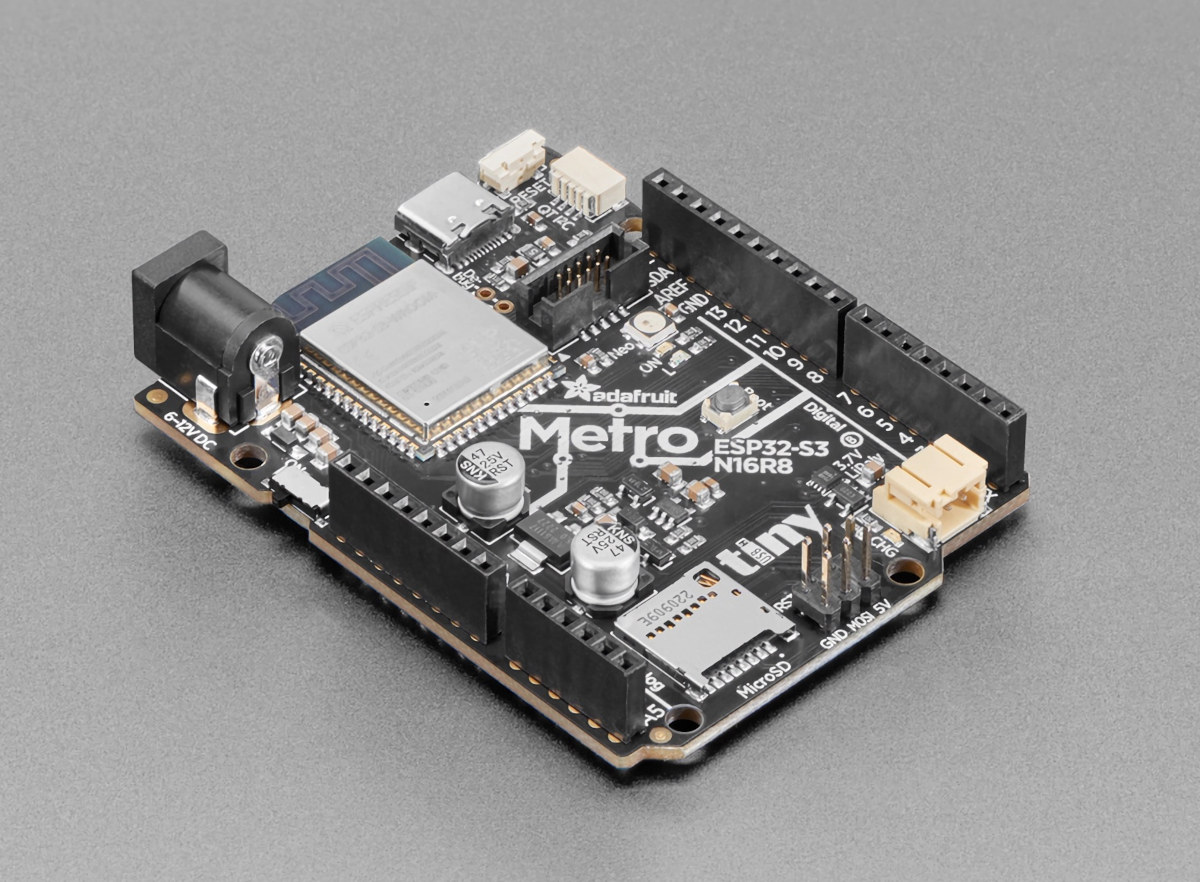The Pendrive S3 is an ESP32-S3 development board in a USB stick enclosure with 128MB of flash memory and an unusual capacitive touch button. The Espressif ESP32-S3-MINI-1 module on the board integrates an Xtensa dual-core 32-bit LX7 microprocessor with support for 2.4GHz Wi-Fi and Bluetooth 5 (low-energy). The device features a capacitive touch button that can be used to trigger actions by touching the enclosure. The capacitive button isn’t visible on the exterior of the device, which helps the device maintain a low profile. You may be interested in Dani Eichhorn’s article on how he came up with the idea of using a spring for the capacitive touch button. The Pendrive S3 stick can be used as a BadUSB device for hacking and penetration testing purposes. With the aid of SuperWiFiDuck, it can perform keystroke injection attacks. All scripts can be managed and controlled wirelessly via a web interface, and […]
ESP32-S3 1.69-inch touch display features 6-axis IMU, RTC, UART, and more
The Waveshare ESP32-S3 1.69-inch touch display is a development board that uses an ESP32-S3 as the main controller. The board features a 240×280 touchscreen LCD that supports 262K colors and is equipped with an accelerometer, gyroscope, RTC, battery management IC, and a USB-C port for programming and power. Previously we wrote about the Waveshare ESP32-S3-LCD-1.28 1.28-inch fully rounded LCD screen that is also built around an ESP32-S3 MCU, and we have also recently written about the similar-looking Waveshare 1.69-inch IPS touch LCD with no onboard MCU that is meant to connect to Raspberry Pi, ESP32-S3, Raspberry Pi Pico, Arduino, STM32, and other boards with I2C or SPI interfaces. ESP32-S3 1.69-inch touch display board specifications: Wireless MCU – Espressif Systems ESP32-S3R8. CPU – Dual-core Tensilica LX7 @ up to 240 MHz with vector instructions for AI acceleration. Memory – 512KB RAM, 8MB PSRAM ROM – 384KB Connectivity – 2.4 GHz WiFi […]
Unexpected Maker NANOS3 might be the world’s tiniest ESP32-S3 module, yet fully-featured
Seon Rozenblum, better known as Unexpected Maker, has launched NANOS3 a development board that claims to be the world’s smallest, fully-featured ESP32-S3 module! This new module packs all the peripherals, and wireless connectivity features of an ESP32-S3 while being even smaller than the TinyPICO Nano. The module features two variants one with an onboard 3D antenna and the other with an u.FL connector. Previously we have written about TinyS3, FeatherS3, and ProS3 boards from Unexpected Maker we have also covered many unique ESP32-S3 boards like the ESP32-S3 PowerFeather Board with solar input, the Waveshare ESP32-S3-Relay-6CH, the ESP32-S3 4G dev boards and more feel free to check those out if you are interested in ESP32 boards with advanced features. Unexpected Maker NANOS3 Specifications SoC – Espressif ESP32-S3FN8 CPU – Dual-core Tensilica LX7 up to 240 MHz with 512KB SRAM, 16 KB RTC SRAM Memory – 2MB QSPI PSRAM Storage – 8MB […]
2×2 Quad Display Board uses Raspberry Pi Pico W or ESP32-S3-WROOM-1 module to drive four displays (Crowdfunding)
SB Components’ 2×2 Quad Display Board is an MCU development board fitted with either a Raspberry Pi Pico W board or an ESP32-S3-WROOM-1 module used to drive four small color displays in square or round shapes. The board specifically features either four 1.54-inch square TFT displays or four 1.28-inch round displays, a microSD card, an RTC with coin-cell battery holder, and a USB-C port for power and programming, plus a few buttons. It may feel like it’s coming out of the but-why-because-we-can department, but the company expects it to be used for signage, interactive displays, art projects, portable devices, data loggers, education, and more. 2×2 Quad Display Board specifications: Main control (one or the other) Raspberry Pi Pico W MCU – Raspberry Pi RP2040 dual-core Cortex-M0+ microcontroller @ 133 MHz with 264KB SRAM Storage – 2MB QSPI flash Wireless – WiFi 4 and Bluetooth LE 5.2 USB – 1x Micro […]
Waveshare ESP32-S3-LCD-1.28 development board with 1.28-inch IPS round LCD is available for $15
The Waveshare “ESP32-S3-LCD-1.28” is an ESP32-S3-based display board featuring a 1.28-inch round LCD screen with a 240×240 resolution, driven by the GC9A01 display driver chip. It also includes a Li-ion battery charger, a QMI8658 6-axis IMU (for motion tracking), a USB Type-C connector, and wireless capabilities. This board is quite similar to others like the Lilygo T-RGB, Round Display for XIAO, ESP32-S3 Round SPI boards. However, it’s thinner and more affordable. Waveshare ESP32-S3-LCD-1.28 development board specifications: Wireless MCU – ESP32-S3 Xtensa 32-bit LX7 dual-core, up to 240MHz frequency. Display: 1.28-inch round IPS LCD. Resolution – 240×240 pixels. 65K color. Display Chip – GC9A01A. IMU Parameters: Sensor – QMI8658 Accelerometer resolution – 16-bit; Range (Optional): ±2, ±4, ±8, ±16g. Gyroscope resolution – 16 bits; Range (Optional) – ±16, ±32, ±64, ±128, ±256, ±512, ±1024, ±2048°/sec. Memory: Built-in 512KB SRAM. 384KB ROM. Onboard 2MB PSRAM. External 16MB Flash memory (W25Q128JVSIQ). Wireless Connectivity: […]
MEMENTO is an ESP32-S3-based, CircuitPython or Arduino programmable DIY camera module
Adafruit’s new MEMENTO – Bare Board Camera module is powered by the ESP32-S3 and can be programmed with CircuitPython or Arduino. The module includes a camera with an OV5640 sensor which features auto-focus capabilities and the board includes a 1.54″ 240×240 Color TFT to display the images. Previously we have covered many ESP32-based camera modules like the TinyML-CAM, the Arduino Nicla Vision, TTGO T-Camera, and many other camera modules that feature the OV5640 sensor you can check those out if interested. Features and Specifications of the MEMENTO ESP32 Camera Module: Processing and Connectivity ESP32-S3 Module Dual-core 240MHz Tensilica processor 8 MB Flash, 2 MB PSRAM WiFi and BTLE capabilities Camera and Display OV5640 Camera Module 5MP sensor 72-degree view Autofocus JPEG encoder 1.54″ Color TFT Display with 240×240 resolution Storage – MicroSD card slot (SPI) Ports and Expansion Two Digital/Analog Stemma Ports – JST PH-3 connectors for A0, A1, power, […]
Raspberry Breadstick – A RP2040-based development board in a quirky form factor
The Raspberry Breadstick is a breadstick-shaped development board that is designed for ease of use. Unlike other development boards, the Breadstick is built to fit directly on your breadboard and interface with the other electronic components in your project without the need for lengthy jumper wires. It serves to deliver a prototype that is neat, straightforward, and easy to troubleshoot. It is based on Raspberry Pi’s debut microcontroller, the RP2040, which is the same MCU chip that powers the Raspberry Pi Pico and several other boards. We recently covered the Waveshare RP2040-PiZero that comes in the Pi Zero’s form factor. The RP2040 is cheap and supports C/C++, MicroPython, and CircuitPython. The Breadstick has other interesting features such as a lineup of 24 addressable RGB LEDs with fast refresh rates, a 6-axis inertial measurement unit for collecting acceleration and rotation data, as well as 16MB of external flash storage for your […]
Adafruit Metro ESP32-S3 WiFi and Bluetooth IoT board comes in Arduino UNO form factor
Adafruit Metro ESP32-S3 is an IoT development board with ESP32-S3 WiFi and Bluetooth wireless SoC, 8 MB PSRAM, and 16 MB Flash that follows Arduino UNO – or Adafruit Metro – form factor. The board also comes with two STEMMA QT I2C connectors for further expansion, comes with a microSD card socket for storage, a JTAG header for advanced debugging, and supports various power options with 6-12V DC via a DC jack, 5V DC via a USB-C port, and a 2-pin connector for a LiPo battery plus the board integrates charging and battery monitoring chip. Adafruit Metro ESP32-S3 specifications: Wireless module ESP32-S3-WROOM-1 MCU – ESP32-S3 dual-core LX7 microprocessor @ up to 240 MHz with Vector extension for machine learning Memory – 8MB PSRAM Storage – 16MB SPI flash Connectivity – WiFi 4 and Bluetooth 5 with LE/Mesh PCB antenna Certifications – FCC/CE certification Storage – MicroSD card slot USB – 1x […]


